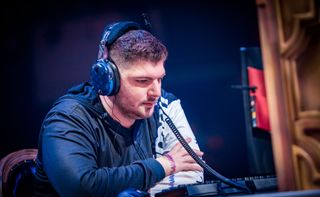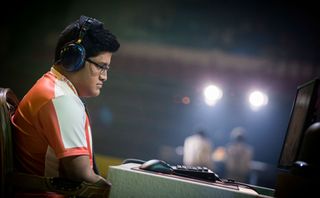Losing in slow motion: How it feels to flame out on Hearthstone’s biggest stage
We spoke to some of the competitors who didn’t win the World Championship to see how they put themselves back together again.

The Taipei Heping Basketball Gymnasium does not seem like a pleasant place to lose. It is one of the many concrete palaces that dot Taiwan's gritty interior, but it felt particularly bleak during the opening days of the 2019 Hearthstone World Championship. In the past, Blizzard has outfitted their Hearthstone esports venues to look like a kind and gentle tavern—the sort of place you might rest your head in Goldshire, or Mulgore, or any of the other peaceful exceptions in the otherwise bloody Warcraft universe. This wasn't that. The competitors took their seats on a monolithic stage, with ear-splitting announcer's calls echoing around the LCD-bathed mausoleum. They looked very alone, up there, which made it even more brutal to watch Mark "Ike" Eichner draw bricks.
We've covered Ike on PC Gamer before. He's the Shaman-loving, affable American kid who finds creative ways to grind ladder while dealing with a lifelong bone disease in his legs. His trip to the World Championship was a bonafide goddamn odyssey. Ike took first place in the HCT Season 3 qualifier, placed sixth in the Winter Championship, before finally, finally squeezing out a ticket to Taipei in a dramatic tiebreaker. All of that, just to go one-and-six at Worlds. Exiting the tournament at the first hurdle meant abandoning both the $250,000 winner’s prize and the rubber-stamped Grandmaster status that ensures you’ll be a permanent fixture in top-level Hearthstone esports for at least the next year.
Eichner brought a rickety Token Druid deck. To give you a sense of how rickety, it includes the card Ornery Tortoise, which does 5 damage to you when you play it, and no other competitor saw the wisdom of including anywhere in their lineup. In a world in which Rogue needs no help dealing damage to your face, that choice was always going to be genius or madness.
"It was even worse because I practiced very hard just to have there be no creative way to do anything"
—Ike
Before the tournament, Ike told me the deck had the potential to high-roll enough times to carry him to the trophy. It seemed plausible—Hearthstone is fundamentally a game of draws, so why not maximize the ceiling of those draws? Unfortunately, the deck betrayed him three times in a row during the elimination match against Kacper "A83650" Kwieciński. I watched in terror from the press area as Ike’s hand slowly clogged with mismatched synergy, constant board clears apparated from the other side of the table, and his strategy was exposed as wishful thinking. It was brutal.
There is a universe where that same Token Druid deck behaved exactly like he hoped it would, and Eicher would now be enjoying some of the stability that's all too rare in esports, and particularly Hearthstone. Unfortunately, Eichner is not a resident of that particular timeline. Imagine how it felt to fly across the world and barely get a chance to even play the game you were there to play. "Being so competitive and wanting to win so bad makes losing a terrible feeling. And this time it was even worse because I practiced very hard just to have there be no creative way to do anything to show off how good I can be at the game."

You need to learn to close yourself off to it. That's what Muzahidul "Muzzy" Islam told me. This was the largest stage Ike has ever played on, but veterans of the scene are used to a certain amount of heartbreak. If you've followed pro Hearthstone over the last couple of years, you'll have seen Muzzy come up short in majors. It’s practically a meme at this point: "One pack Muzzy." Statistically, the dude is one of the greatest of all time—he's made it to the Hearthstone World Championships twice (we wrote about his failure to make it out of the group stage in 2017), and he's one of the most respected pros in the community, but he's yet to dominate on the world stage.
There was a lot of frustration involved in dealing with losses. Nowadays I don't feel much of anything.
—Muzzy
It's the sort of paradox that can make a bad Hearthstone defeat tough to watch, especially as the pace of the game means that the pain often feels like it’s playing out in slow motion. The best pros in the world trudge through matches they know they cannot win, out of an adherence to the one-in-eight-billion swing that might alter their fate. As far as Muzzy sees it, that's the rollercoaster players have signed up for. The faster you learn to accept it, the happier you'll be.
The biggest gaming news, reviews and hardware deals
Keep up to date with the most important stories and the best deals, as picked by the PC Gamer team.
"In the past a huge loss would upset me quite a bit. I spent a lot of years of Hearthstone tournaments losing before I got a major win [DreamHack Montreal in 2017]. There was a lot of frustration involved in dealing with losses. Nowadays I don't feel much of anything," he explains. "I have become a lot more apathetic in the handling of my losses and wins and feeling happy for my opponents success. After a loss now I do feel sad a little bit, but I move on within minutes."
Ike didn’t wallow in his sadness for long. He didn't retire or uninstall. He needed no time to re-find himself. Instead, for therapy he turned to the one thing that had just deserted him: Hearthstone. After the biggest gaming defeat of his life, Eichner was soon back on ladder, prepping for whatever comes next. "I felt motivated… because I didn’t feel like I was able to showcase and prove how well I can play," he says. "So the natural feeling was I want to go out and destroy everybody and play as well as I know I can."
![Viper [right] greets Hunterace before the final match. Little did he know what was coming. ©Blizzard, Helena Kristiansson](https://cdn.mos.cms.futurecdn.net/wmRgbf425YASgfo4YdeP4Y-320-80.jpg)
Ike tells me he's learned to rely on videogames, whether he's dealing with emotional or physical pain. It's particularly prescient from him, considering how he's regaled us with stories of grinding through ladder during lengthy hospital visits. Still, it was surprising to see his resolve in action. Sometimes I can't even look at Hearthstone for a few days after I've suffered a particularly bad beat. But those stakes are so low. There's no money on the line, I'm just hardstuck at rank three. Maybe that's the the difference between professionals and civilians; a maniacal, passionate refusal to ever let the bastards have the last laugh. A latent desire to get better, when I'd be blaming RNG. After all, Muzzy reported the same thing: "I was playing Hearthstone probably within an hour of losing Worlds."
And then, of course, are moments when it all works out. At every Hearthstone tournament, there are at least a couple. This year, one belonged to Torben "Viper" Wahl. The German pro has been embedded in the competitive infrastructure in 2016, but his second place finish at HCT dwarfs his past, and probably all of his future, accomplishments in the game. Viper finished second, losing to child prodigy Casper “Hunterace” Notto in the final. The last game has already gone down in Hearthstone esports folklore as one of the most gloriously ridiculous ever played. Watch the madness unfold below.
You might expect that experience to also be bruising, but Viper left the Taipei Heping Basketball Gymnasium $150,000 richer, and a newly-minted Grandmaster to boot. Given the volatility of his craft, it makes total sense that he views any big victory as a pleasant surprise, rather than something to build your expectations around. Despite not winning the top prize, he left delighted.
You [often] don’t get what you want, no matter how much effort you put into things... That’s just how life is."
—Viper
"You don’t always win,” he tells me. "You [often] don’t get what you want, no matter how much effort you put into things. That’s just normal, that’s how life is—but if, eventually, you get there, winning game after game after game, it feels fantastic. And going into tournaments you always want to win, but never expect it. I usually hope to do well, reach the top cut, make it out of groups… Something like that. So after reaching my expected goal I felt like: ‘Okay, this is it, this is my day. I am going to win it all."
"Every card coming in the right order, every good decision getting rewarded—it feels insanely nice. These moments of triumph are the moments that keep me going, keep me trying, and they make up for all the losses."

Luke Winkie is a freelance journalist and contributor to many publications, including PC Gamer, The New York Times, Gawker, Slate, and Mel Magazine. In between bouts of writing about Hearthstone, World of Warcraft and Twitch culture here on PC Gamer, Luke also publishes the newsletter On Posting. As a self-described "chronic poster," Luke has "spent hours deep-scrolling through surreptitious Likes tabs to uncover the root of intra-publication beef and broken down quote-tweet animosity like it’s Super Bowl tape." When he graduated from journalism school, he had no idea how bad it was going to get.
Most Popular


